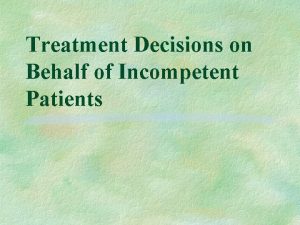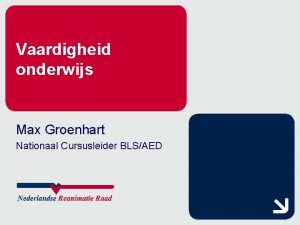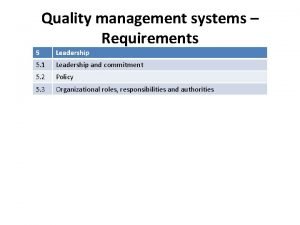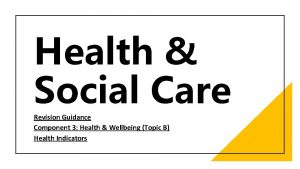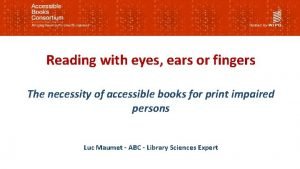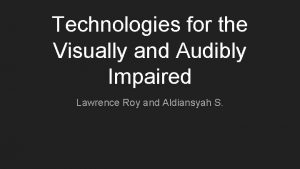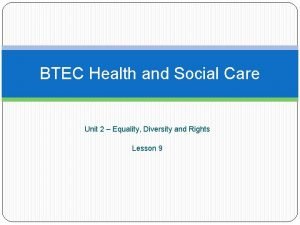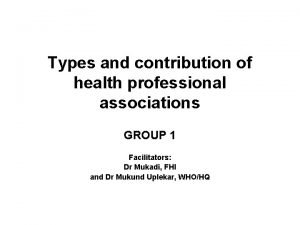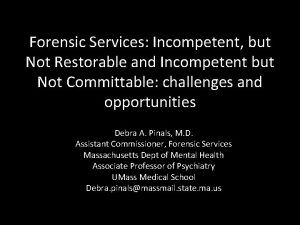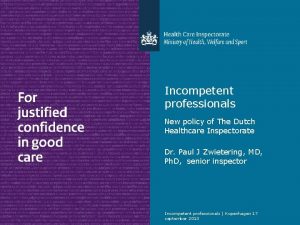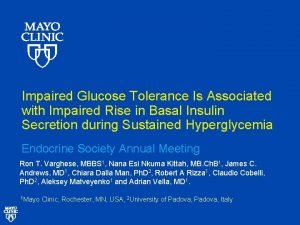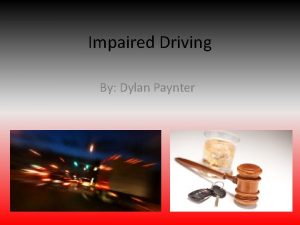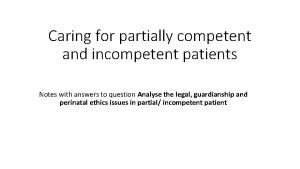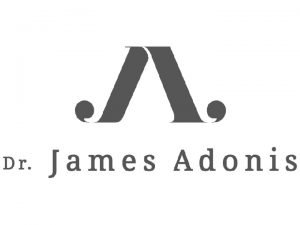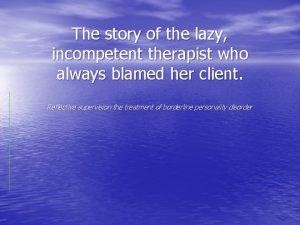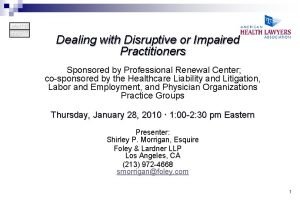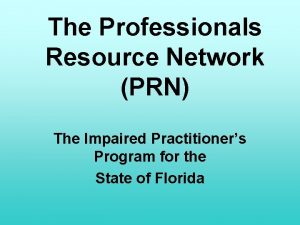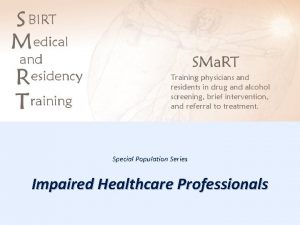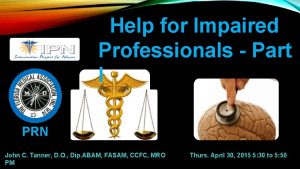Dealing with impaired and incompetent health care professionals
















- Slides: 16

Dealing with impaired and incompetent health care professionals Survey research amongst ten health care professions Jan-Willem Weenink MSc Tijn Kool Phd IQ healthcare Radboud University Nijmegen Medical Centre ~ EPSO Conference Copenhagen, September 2013 ~

IQ healthcare • Scientific research projects and education in the field of quality, safety and ethics in healthcare • Radboud Nijmegen University Medical Centre (RUNMC) • 8 professors, 20 senior staff members, total of 130 employees

Index 1. Project background 2. Realisation and contents of the questionnaire 3. Results 4. Continuation of the project

Background • Project ‘Identification of impaired and incompetent health care professionals’ • Project – Interviews with important stakeholders in Dutch healthcare – Foreign policy and experiences 1. Dentists – Survey research amongst 10 health care professions 2. Elderly Care Physicans 3. 4. 5. 6. 7. 8. 9. 10. General practitioners Medical specialists Midwives Nurses Pharmacists Physiotherapists Psychologists Psychotherapists

Definition of impairment/incompetence Impairment/incompetence concerns a (1) structural situation, (2) of irresponsible healthcare delivery, (3) which is (potentially) hazardous to the patient, and (4) in which the specific healthcare professional is not able or willing to restore by him- or herself. – – Structural Irresponsible Potentially hazardous No solution without intervention

Realisation questionnaire • Existing literature • Expert group IQ healthcare • Health care professional organisations and Inspectorate • Pilot study in two professionals of each profession

Contents questionnaire 1. Experience with an impaired/incompetent colleague 2. Support in dealing with impairment and incompetence 3. Evaluation of own competence 4. Hypothetical cases 5. Who takes and needs to take responsibility (5 phases)

Study population • Professions: 27%, range 17 -41% Age (sd) % female Work experience (sd) % paid employment % working without colleague of same profession Study population 49 (11, 4) 64% 18 (10, 1) 40% 21% • Respondent characteristics are comparable to known figures of each profession in the Netherlands

Experience with impaired/incompetent colleague • Types of impairment/incompetence • • Abnormal medical practice Cooperation problems with colleagues Communication problems with patients • Professionals that took action • • Discussed it with the impaired professional Discussed it with colleagues

Support in dealing with impairment/incompetence • Knowledge on what to do with a impaired. . • • colleague within own institution colleague outside own organisation • Experienced support • • Support from partnerships/group practice Policy of institution • Desired support • • • Protocol from professional organisation During education Helpline

Evaluation of own competence • Evaluation using instruments or methods • • • Feedback groups Job evaluation conversations Auditing • Motivation for not using instruments • • No specific reason Not available in my institution

Who’s responsibility? • Who needs to take responsibility? • • Prevention and signalling: impaired professional himself, colleagues & superior Determining: colleagues, superior & inspectorate Taking measures: inspectorate & profession organisation Rehabilitation: impaired professional & inspectorate • Discrepancy in all phases for situation now and ideal situation

In summary • Experiences with impaired/incompetent colleague • When professionals suspect impairment of a colleague, they discuss it with the impaired colleague or other colleagues • Evaluation of own competence with instruments/methods • Discrepancy between experienced support and desired support • All stakeholders need to take more responsibility

Remarks • Low response – – – Delicate subject? Time investment? No non-respondent analysis • Socially desirable responses?

Continuation of the project • Phase 2 (August 2013 – August 2015) – Monitoring of developments regarding dealing with impairment/incompetence – Case studies organisations (best practices) – Follow-up questionnaire

Questions? Thanks! Jan-Willem Weenink MSc Tijn Kool Phd IQ healthcare Radboud University Nijmegen Medical Centre J. Weenink@iq. umcn. nl T. Kool@iq. umcn. nl
 Incompetent patient
Incompetent patient An incompetent government massacres on bloody sunday
An incompetent government massacres on bloody sunday Onbewust incompetent
Onbewust incompetent Qms agrisciences
Qms agrisciences Incompetent
Incompetent Incompetent
Incompetent Health and social care component 3 health and wellbeing
Health and social care component 3 health and wellbeing Impaired eyes and ears
Impaired eyes and ears Virginia department for the blind and vision impaired
Virginia department for the blind and vision impaired Visually and audibly
Visually and audibly Modern input and output devices
Modern input and output devices Unit 2 equality diversity and rights
Unit 2 equality diversity and rights Types of health professionals
Types of health professionals Health professionals follow-up study
Health professionals follow-up study Allied medical professions list
Allied medical professions list Allied health professionals
Allied health professionals What is waste management
What is waste management
